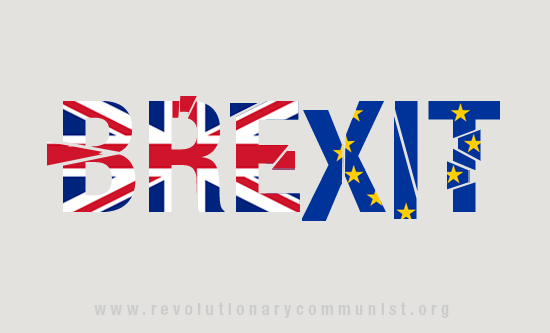
Britain’s political class is leading the country towards economic disaster after Prime Minister Theresa May invoked Article 50 on 29 March to trigger acrimonious Brexit negotiations with the EU. With a strong possibility that the two parties will split without reaching a trade deal, Secretary of State for Exiting the European Union David Davis has said that the government has made no assessment of the effects of defaulting to World Trade Organisation (WTO) trading rules, other than to admit that expensive tariffs would be raised for trading with EU states. Motivated by the desire to abandon a sinking ship, Northern Ireland, Scotland and even Wales are now considering plans to leave and break up the United Kingdom. The crisis is a manifestation of extreme decay setting into the capitalist system – the need for the working classes throughout Britain and Ireland to unite and rebuild the socialist movement is increasingly clear. Barnaby Philips reports.
Appearing in front of a committee of MPs on 15 March, Davis reiterated the government’s position that ‘no deal is better than a bad deal’. The only assessment backing up that claim was made before the referendum took place, but, he admitted, ‘those forecasts don’t appear to have exactly been very robust since then’.
High-ranking European politicians assert that Britain may well ‘crash out’ of Europe without a deal if it continues attempts to ‘blackmail and divide’ EU countries. German MEP Elmar Brok told The Guardian: ‘If they negotiate while trying to interfere in our side then we can do that too. We can make a big fuss over Scotland. Or Northern Ireland.’ Dealing a pre-emptive blow, the EU has also warned airlines including easyJet, Ryanair and British Airways that they will need to relocate their headquarters and sell off shares to European nationals if they want to continue flying routes within continental Europe after Brexit.
In the face of the threat to Britain’s economy, Davis claimed provocatively that the benefits of a no-deal exit could outweigh the negatives, in that the UK would be freer to reduce tariffs and barriers with non-EU states. The evidence suggests otherwise. India, the world’s fastest growing major economy and third biggest investor in Britain, has like others warned that the current appeal of Britain is that it serves as an ideal launching point for trade with the rest of Europe. Britain’s unwillingness to relax visa restrictions for Indian nationals is another stumbling block to a trade deal.
Even a good new trade deal with the US is in doubt. Wilbur Ross, a billionaire investor who said Brexit was ‘a God-given opportunity’ for competing nations to draw trade away from the UK, has been confirmed as President Donald Trump’s Commerce Secretary, and will play a leading role in the new administration’s ‘America First’ approach to business (The Independent 28 February).
Meanwhile, the number of EU nationals registering as nurses in England has dropped by 92% since the referendum in June, and a record number have left the NHS. Only 96 nurses joined the NHS from other European nations in December 2016, a drop from 1,304 in July, the month after the referendum. 80 of 136 NHS acute trusts in England have reported that 2,700 EU nurses left the health service in 2016 – a 68% increase compared to 2014. (The Guardian 18 March).
Britain is already starting to look isolated and unwanted, a position it can ill afford with its weak exporting market. A wildly fluctuating trade deficit stood at £6.4bn in January despite the cheaper pound. Having slumped after the referendum vote by 17% to below $1.30, the pound fell again to around $1.25 in October and then $1.20 in January. Although it crept up to $1.24 in March, some estimates expect it to plunge to $1.06 by the end of the year (Financial Times 17 March).
Nationalist mood spreads
Westminster was given another headache when the Scottish National Party (SNP) confirmed its intention to hold a second independence referendum within two years. The SNP is desperate to retain access to the Single Market, but Scotland’s First Minister Nicola Sturgeon is unable to say whether or not an independent Scotland would be able to rejoin the EU. Undeterred by the irony, May lashed out at Sturgeon’s ‘tunnel vision’ and ‘divisive and obsessive nationalism’.
A nationalist mood is growing even in Wales, where Leanne Wood has said her Plaid Cymru party must now prioritise a campaign for Welsh independence. Labour’s Welsh First Minister Carwyn Jones warned that an ‘inter-UK trade war’ could lie ahead if new UK-wide trade rules were not established before Brexit (BBC 18 March).
Of even greater concern to Britain’s ruling class will be the renewed demand for a united Ireland. Emboldened by significant electoral gains, Sinn Fein is campaigning for a referendum to take Northern Ireland – which like Scotland voted to remain in the EU – out of the UK ‘as soon as possible’. Whether the ruling class can hold the Union together remains to be seen.
No parliamentary oversight
Any illusions that the government’s Brexit negotiations would be subjected to parliamentary oversight were dashed when the House of Lords amendment demanding a ‘meaningful’ parliamentary vote on the final deal was rejected by the House of Commons. So too was the amendment which demanded a guarantee to the rights of EU nationals.
As the British ruling class continues to make enemies at home and abroad, it is vital that the working class organises to defend itself in preparation for the disastrous consequences of the Brexit fallout.
Fight Racism! Fight Imperialism! 256 April/May 2017




